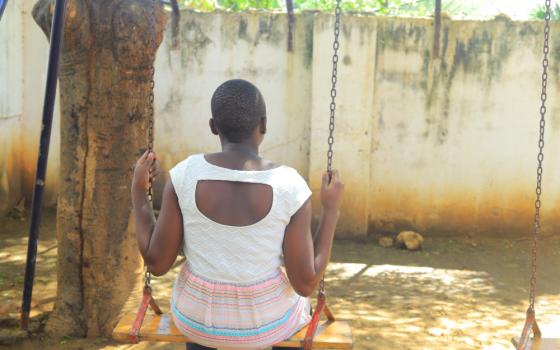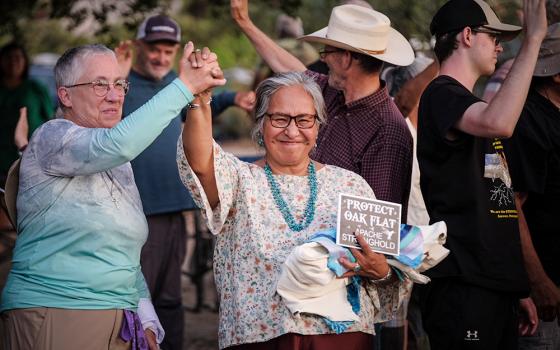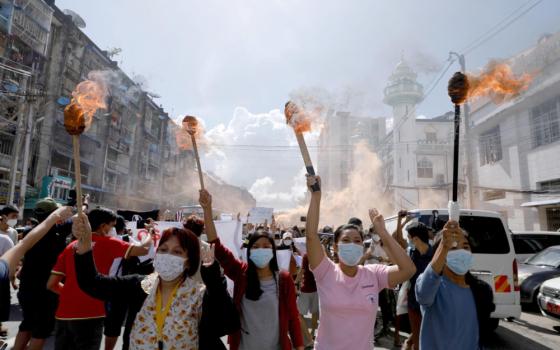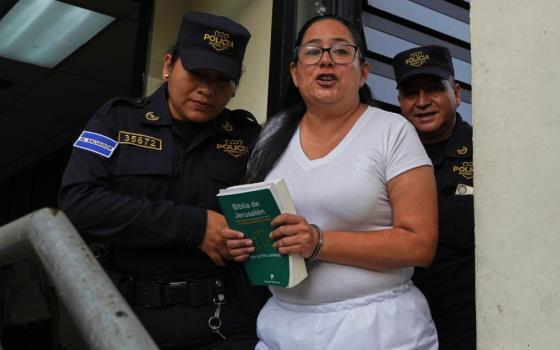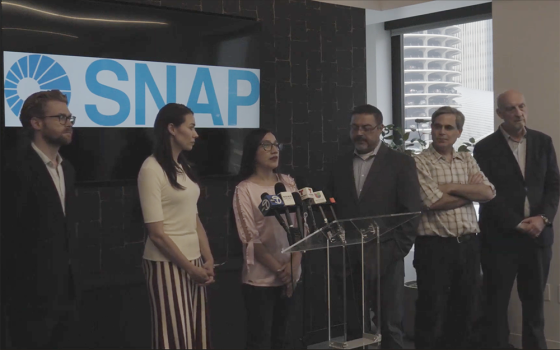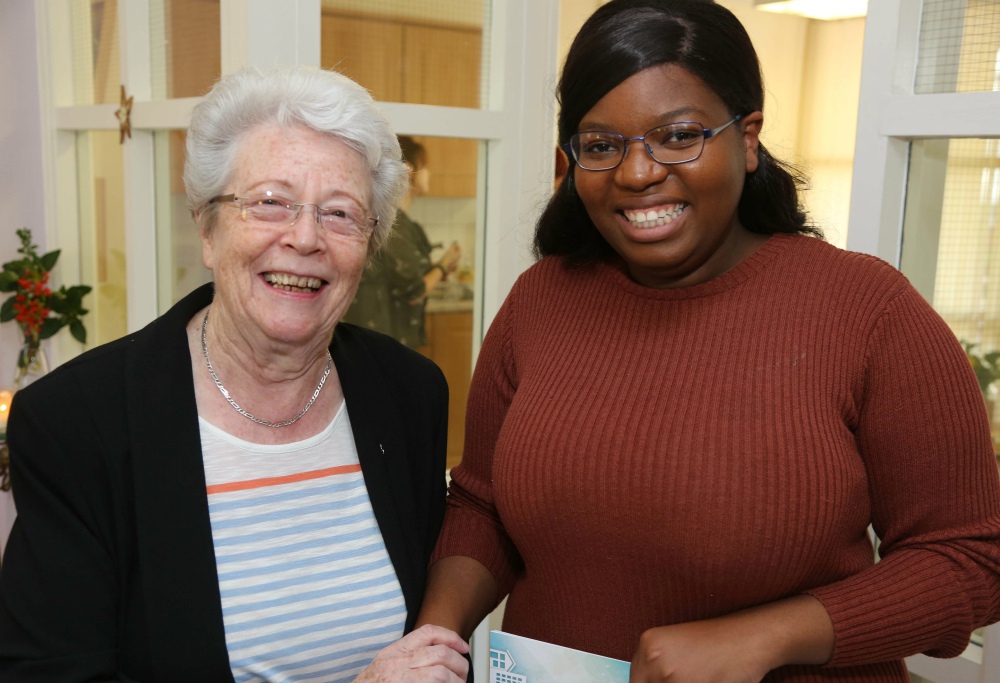
Mercy Sr. Helena O'Donoghue, left, with Rutendo, a client of Mercy Law Resource Centre in Dublin. The center, set up by the Sisters of Mercy, provides free legal advice and representation to people experiencing homelessness. (MLRC/David Speirs)
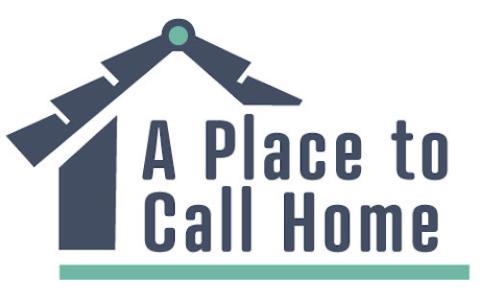
(GSR/Toni-Ann Ortiz)
Editor's note: More than 1.6 billion people worldwide live in substandard housing. Of those, at least 150 million have no home at all. In this special series, A Place to Call Home, Global Sisters Report is focusing on women religious helping people who are homeless or lack adequate shelter. The series examines how homelessness and a lack of affordable housing affect teens and young adults, families, migrants, the elderly and those displaced by natural disasters and climate change in stories from Kenya, India, Vietnam, Ireland, Puerto Rico, the Philippines, the United States and elsewhere.
Last year, Blessing was homeless and had been put in unstable emergency accommodation in Dublin by the local authority. She had to move out of her accommodation each day with her four young children and had nowhere to go during the day. She was worn out, and her children were struggling.
"I was destitute and going through a really bad time," said Blessing, who is African-Irish and did not give her full name. "I had only myself and my four children. I was alone and had no one to rely upon."
Blessing was at a loss as to how to find more secure accommodation that would enable her and her children to establish some stability. Getting her children to school from far-flung accommodation in Dublin that changed daily was a nightmare.
The Mercy Law Resource Centre, which provides free legal advice and representation to people experiencing homelessness, learned of her case through a partner agency. After intervening and making legal representations to the local authority on the family's behalf, Blessing and her four children, whose story was told in the law center's 2019 annual report, were moved into stable and secure emergency accommodation.
"Mercy Law was a lifesaver," the young African-Irish mother told Global Sisters Report.
In October 2019, more than 10,000 people were experiencing homelessness in Ireland, the highest number ever on record, according to Focus Ireland, one of the largest housing and homeless organizations in the country. That number fell to approximately 8,700 in August 2020, the most recent figures available, partially because of eviction bans and rent freezes aimed at keeping people in stable accommodation to stem the spread of COVID-19 as well as more Airbnb properties becoming available for rent.
For homeless agencies and sisters working with those experiencing homelessness, it's an indication that with the right will and the right measures, homelessness in Ireland could be addressed and potentially eliminated.
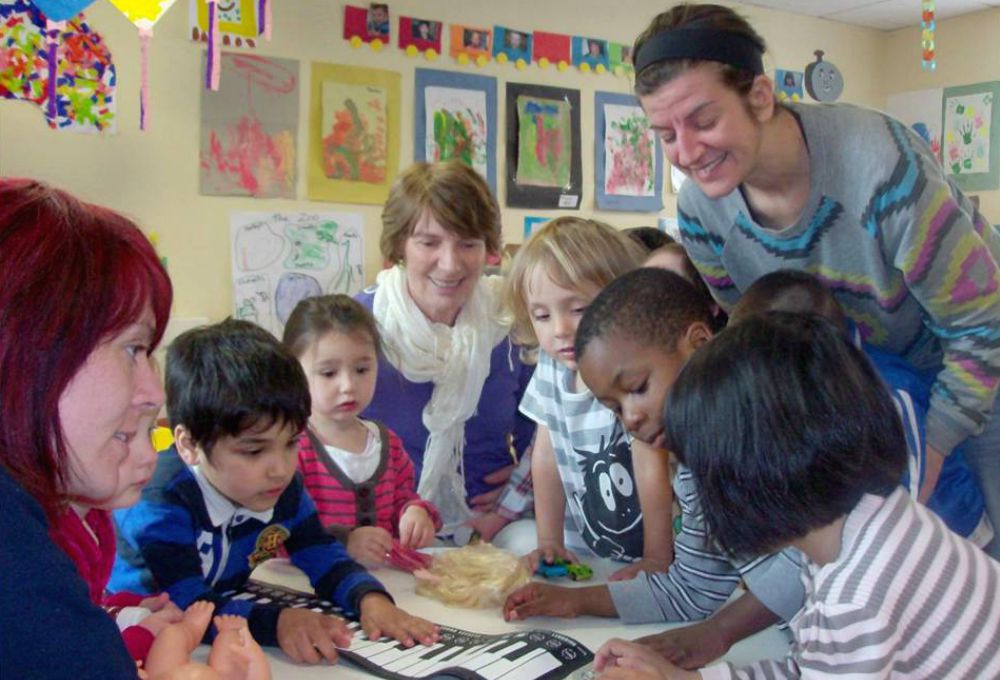
Daughter of Wisdom Sr. Grainne Hilton, center, with families in Sophia Housing's Cork Street project in Dublin (Provided photo)
In February, Mary McAleese, former president of Ireland, spoke to the United Nations Commission for Social Development on homelessness and highlighted how Ireland's housing system has continued to fail vulnerable people, leaving them exposed to eviction and at risk of prolonged stays in emergency accommodation with inadequate long-term housing available.
Between 2014 and 2018, the Organization for Economic Cooperation and Development found that homelessness in Ireland had grown by almost 150%, McAleese noted in her U.N. address.
Calling for an end to the "shameful mess" of homelessness, she highlighted how homeless charities first alerted people in Ireland to the changing face of homelessness in the last few decades. It has seen a shift from rough sleepers — who were predominantly male and had complex problems, including addiction or mental health issues, that were often overlooked — to family homelessness.
The reasons for this shift are complex, she said, but contributing factors include a rapidly growing population, significant inward migration, a dysfunctional housing market too dependent on the private housing sector, and an inadequate supply in the public rental sector.
Meanwhile, the private rental sector continues to experience unprecedented demand, with consequent upward pressure on rents. As of August, there were 2,620 children in 1,120 families who were homeless, according to latest figures from the Department of Housing, Local Government and Heritage.
"A safe, affordable and adequate home should be the right and the experience of each human being. It is a prerequisite of human flourishing," McAleese told the U.N.
Advertisement
Sophia Housing's partnerships address a great need
One of the agencies McAleese praised at the United Nations for its holistic approach to housing needs and to healing the trauma of homelessness is Sophia Housing in Dublin. Founded in 1999 by Sr. Jean Quinn, a member of the Daughters of Wisdom, it is a collaborative venture drawing support from a number of religious orders in Ireland.
Sophia's slogan is "providing homes, supporting people," a philosophy that recognizes that a home is not just about physical space and a key to a front door.
"Our vision is for an Ireland where homelessness, and the trauma caused by homelessness, is eradicated from our society," Quinn said.
This entails not just providing a home or shelter but also the "wraparound" supports — disability services, primary care teams, psychology and psychiatry supports — that families and individuals may need to help address the trauma of their experiences and, sometimes, issues such as addiction or the legacy of domestic violence, Quinn added.
In addition to her role as director of Sophia Housing, Quinn, 71, who is originally from Sligo in the northwest of Ireland, is the first Irish woman to be appointed executive director of UNANIMA International, a nongovernmental organization based at the United Nations in New York. Its work is focused on supporting women, children, migrants (especially those affected by poverty) and the environment.
Quinn first became aware of the problem of homelessness while studying theology and philosophy at the Jesuit-run Milltown Institute of Theology and Philosophy in Dublin in the 1980s: Back then, it was mainly rough sleepers on the streets or in doorways, parks or cars. It prompted her to get involved in Focus Ireland, founded in 1985 by Sr. Stanislaus Kennedy, a member of the Religious Sisters of Charity.
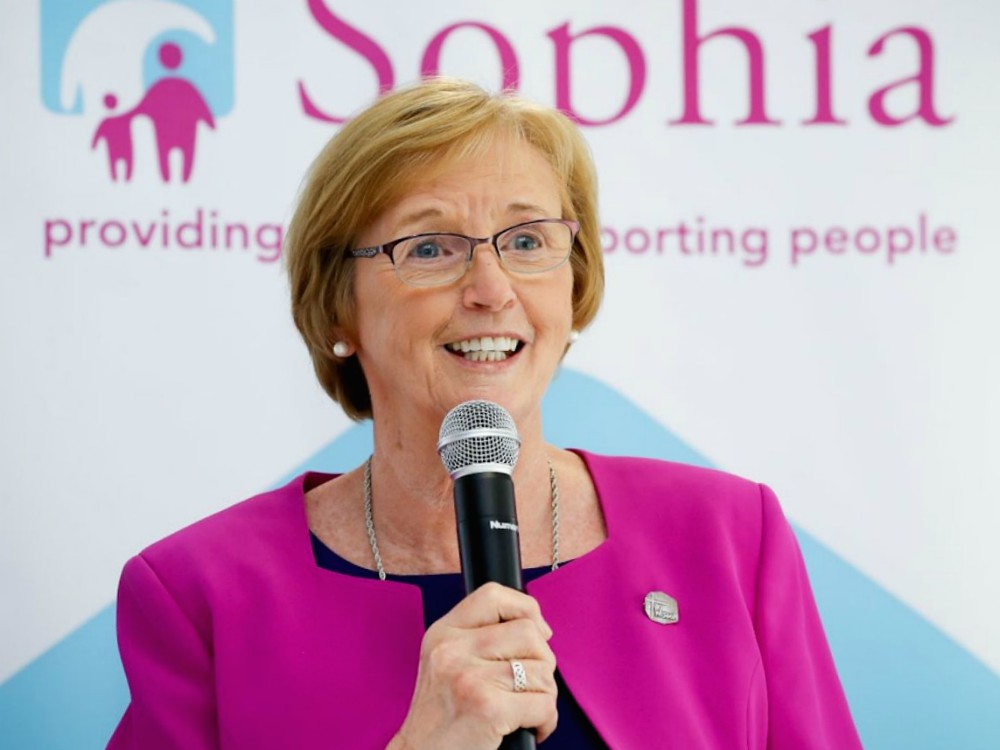
Sr. Jean Quinn, a Daughter of Wisdom, the founder of the Sophia Housing Association and executive director of UNANIMA International (Provided photo)
With the support of her congregation, Quinn moved from Sligo, where the Daughters of Wisdom ran Cregg House for people with intellectual disabilities, to Dublin in 1986 with Sr. Grainne Hilton, also a Daughter of Wisdom, so they could both become involved with helping people experiencing homelessness.
After undertaking a course in human and personal development in the Wellsprings program in upstate New York between 1995 and 1997, Quinn's dream for supported housing in Ireland began to evolve. She researched models of holistic care in New York, France and the United Kingdom. On her return to Ireland, she sought her congregation's backing to get Sophia Housing off the ground.
"I was absolutely convinced that support was needed and that children had to be part of that story because they had their own unique experiences, distinct from their parent or parents," she said. "At the time, people looked toward adults rather than looking toward children. To see the experience of homelessness on the children's faces — I found it so painful."
By 2019, two decades after Sophia began, it had helped more than 1,000 people find a home or less precarious accommodation. Sophia currently houses 259 adults and 169 children, with another 108 people supported in outreach programs that help older people as well as those with disabilities. It also provides training, education, nurturing and parenting services. The Wisdom Centre offers meditation, arts and crafts, workshops, gardening, and holistic care.
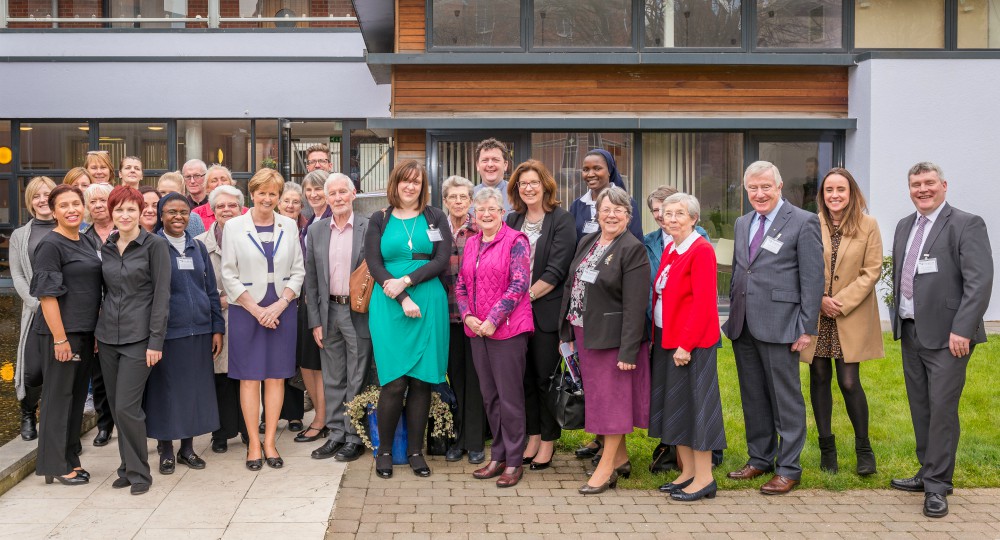
Sr. Jean Quinn (front row, fourth from left) and members of the team of Sophia Housing in 2017 (Provided photo)
Quinn said Sophia could not have achieved this without the 27 religious partnerships that have underpinned its work over the past two decades.
"Their support has been instrumental from the very start of the organization," she said. "We have worked together to create hundreds of homes and impact the lives of countless people."
Over the next five years, Sophia Housing plans to build more than 200 homes across the country. In February, just ahead of the COVID-19 pandemic, it was granted planning permission to build 52 homes on land formerly owned by the Presentation Sisters in Portlaoise, County Laois.
The development is the culmination of a process that began in 2000, when the order's offer of their land was blocked by the planning authorities over concerns about its proximity to schools adjacent to the site. In 2015, the schools moved to a new location, paving the way for the Sophia project to proceed.
Sr. Frances Crowe is the Presentation Sisters' liaison with Sophia. The 76-year-old looks after her order's property in one of its two Irish provinces, which between them have more than 500 sisters. With the majority of the Presentation Sisters in Ireland now in their 70s and older, houses and convents are being vacated.
"We are offering something less than 3 acres comprising a convent, which at one time housed about 40 sisters; a former primary school; and the convent garden, which will be restored to its former glory for the good of the people of Portlaoise," Crowe told Global Sisters Report.
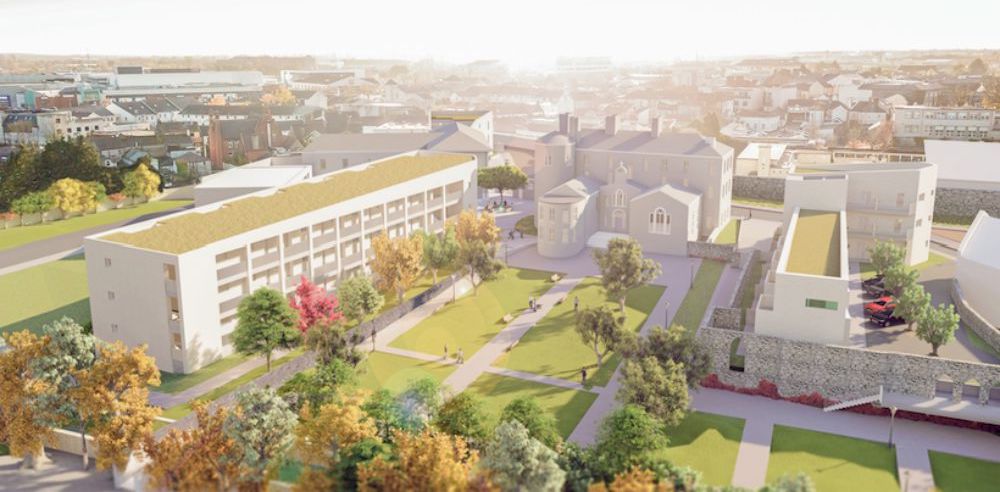
An artist's rendering of the planned Sophia Housing development on the land of the Presentation Sisters in Portlaoise, County Laois (Provided photo)
She said the sisters feel their work with Sophia ties in with the housing outreach of their foundress, Venerable Nano Nagle, who founded a safe home for poor elderly women in 18th-century Cork.
"Housing is one of the greatest needs of our times. We have properties, and we are willing to give them at reduced cost," Crowe said. "We see the ethos of Sophia in looking after the vulnerable and excluded as close to the hearts of Presentation Sisters; we see ourselves involved in this by providing properties we can no longer use for our own ministries."
Sophia recompenses the religious orders who offer land or sites. The money the Presentation Sisters get will be used to pay for nursing home care and adapted accommodation for their increasingly older membership.
Though long past retirement age and despite looking after the Presentation Sisters' property portfolio, Crowe also gives time to helping those exiting Ireland's direct provision in the town of Athlone. (Direct provision is the Irish state's much-criticized system that provides asylum-seekers with food and shelter while their claims for refugee status are being processed.)
Crowe is critical of the way the system drops asylum seekers once they get their residency.
"There is absolutely nobody to help them access housing," she said.
She said she is also concerned about the substandard properties landlords try to offload on this vulnerable group of people at hefty rates.
"I was absolutely shocked," she said. "I got a lot of insight into how difficult it is for people who are already traumatized when they came to Ireland and how it is made so difficult for them to find a place to live."
Legal help for those experiencing homelessness
Sophia's headquarters on Cork Street in Dublin are based in what were once convent buildings belonging to the Sisters of Mercy. There, the Mercy Law Resource Centre, which operates out of three rooms in the office, advocates for those experiencing homelessness in a way that dovetails with Sophia's mission.
"In general in society, we see legal services as a last resort, as they cost the earth," said Mercy Sr. Helena O'Donoghue, the center's chairperson, who has been involved with the organization since its start in 2009. "You don't go looking for legal services unless you have no other way out. But people who are very poor can tend to lose the strength within themselves to fight for their situation, even though it is unjust and unfair, unless they have somebody with legal skill who can speak for their cause."
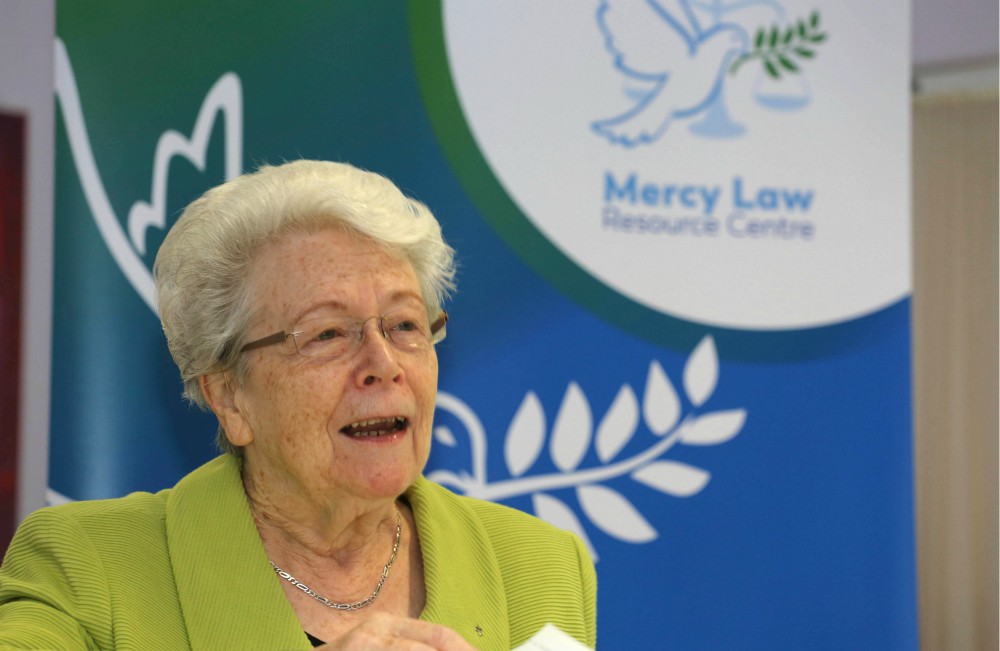
Mercy Sr. Helena O'Donoghue, chairperson of the Mercy Law Resource Centre, speaks at a September 2019 event marking the center's 10th anniversary (MLRC/David Speirs)
The center runs legal advice clinics on areas like eviction and rent hikes within other agencies involved in homelessness, such as Focus Ireland, the Crosscare Migrant Project and the Peter McVerry Trust.
These legal services the center provides through its six full-time staff are free. The Sisters of Mercy, who set up the service, cover about one-third of the center's annual costs. The remaining costs are covered through donations from supporters, including the Dublin Archdiocese.
O'Donoghue, 79, said without the pro bono work from volunteer barristers, solicitors, administrators and befrienders, these costs would be double.
"The Mercy Law Resource Centre is in a category of its own within the large community of agencies who respond to people who find themselves in homelessness," O'Donoghue said. "Most of the agencies provide practical advice and supports and advocacy for their clients, but we're the only group specifically providing a free legal advocacy and a representation service."
The center's 2020 annual report showed that it provided help to almost 500 families last year, and free legal advice and representation to 1,611 individuals and families.
"Initially, it was very much individuals living in Ireland who came for assistance," she said. "But then, following the financial crash [in 2008], we began to see more families, single parents with young children who felt the impact of rents rising and properties being sold by landlords with little notice to tenants — eviction — and who found it difficult to find alternative accommodation because very few places provide enough space for a family."
Over the last couple of years, the Mercy Centre has dealt with more cases relating to members of the Traveller and Roma communities.
"It is a diverse group of people in need," O'Donoghue said. "We would also have had people who you never would have expected to find themselves on a homeless list, people whose circumstances just suddenly got beyond their control in terms of their renting situation, and so they found themselves in situations that were very serious mentally as well as economically."
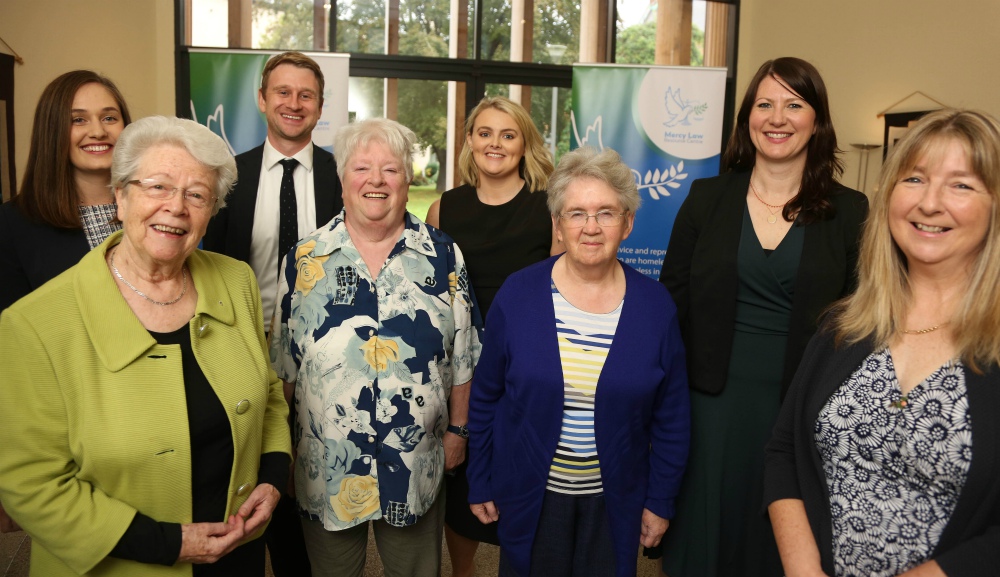
The Mercy Law Resource Centre team (MLRC/David Speirs)
When McAleese addressed the United Nations in February, she drew on her own personal experience of homelessness when her family was forced out of their Belfast home during the Troubles.
Another Irish woman told U.N. delegates how Sophia had helped to turn her life around.
"Through economic empowerment, employment and education ... we have been able to find meaning and purpose ... returning us back to the human beings we were meant to be," Liz Madden stated in her U.N. address.
Fifteen years ago, at the age of 23, she became a resident of Sophia Housing in Cork city. She was at a low ebb at the time and eight months pregnant. In addition to getting the keys to an apartment, Sophia also assigned her a support worker who "encouraged me to explore educational courses and return to education, listened to me with no judgment, met me at my level."
Madden, who left school at 15 without completing her education, is now lecturing at a university and credits Sophia's support and concern for her well-being and with helping her to get where she is today.
"I worked my way to a master's degree, and I was approached by University College Cork to lecture on the diploma in development and global human rights and the diploma in women's studies," she said.
"When you are nurtured and given that type of support, there is progress toward healing," she said of Sophia's role in turning her life around. "My support worker really encouraged me to keep going, and my life just kept improving."
As her son nears the completion of his secondary schooling, she told GSR, "I am moving into full-time employment. Hopefully, I can move out of this house and free it up for somebody else to benefit from what Sophia Housing gave me. That would be my dream."
[Sarah Mac Donald is a freelance journalist based in Dublin.]
Sisters in housing ministry around the world
When GSR developed A Place to Call Home, we knew our series would not be able to fully encompass sisters' work internationally. We wanted to include the efforts of as many sisters as possible who are addressing homelessness and/or affordable housing issues. So we created a questionnaire so you could tell us how you, your community, or sisters you know are giving others a place to call home.
So far, we have received more than 80 responses, which we used to create this interactive map showcasing sisters' work. Don't see your community here? Please add to our map, by filling out our questionnaire here.

